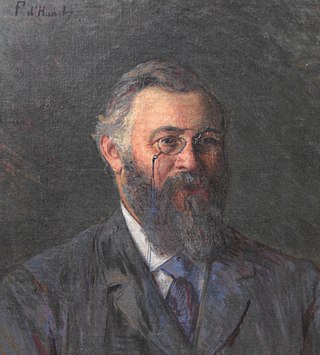External links
- (in French) Chamber of Deputies official biography
Jean Colombera (born 2 February 1954 in Esch-sur-Alzette) is a Luxembourgish physician and politician of the Alternative Democratic Reform Party. He was a member of the Chamber of Deputies from 1999 to 2012, representing the Nord constituency.
Born in Esch-sur-Alzette, Colombera is an Italian Luxembourger. He was formerly an Italian citizen, but gained Luxembourgish citizenship in 1999. [1] Originally a Green, after gaining citizenship (a condition for being a deputy), Colombera asked Jean-Pierre Koepp if the ADR had a spare slot on their list in Nord, [1] in which his hometown of Vichten is located.
In the 1999 election, Colombera was elected, narrowly finished second (behind Koepp) on the ADR's list, with two being elected. [2] Colombera lost his seat in 2004, as the ADR lost its second seat in Nord and Colombera once again came second, again behind Koepp. [3] He regained his seat in the 2009 election, after Koepp retired, allowing Colombera to re-enter the Chamber despite the ADR falling to fifth place in the constituency. [4]
Colombera is a campaigner in favour of legalising medical cannabis. He is head of the Francophone Union for Cannabinoids in Medicine (French : Union Francophone pour les Cannabinoïdes en Médecine). He is under investigation for prescribing cannabinoids to his patients, under Luxembourg's Narcotics Act. [5]
Luxembourg is a parliamentary representative democratic monarchy, whereby the prime minister is the head of government, and the multi-party system. Executive power is under the constitution of 1868, as amended, exercised by the government, by the grand duke and the Council of Government (cabinet), which consists of a prime minister and several other ministers. Usually, the prime minister is the leader of the political party or coalition of parties having the most seats in parliament. Legislative power is vested in both the government and parliament. The judiciary is independent of the executive and the legislature.
Elections in Luxembourg are held to determine the political composition of the representative institutions of the Grand Duchy of Luxembourg. Luxembourg is a liberal representative democracy, with universal suffrage guaranteed under its constitution. Elections are held regularly, and are considered to be fair and free.

The Alternative Democratic Reform Party is a conservative and mildly populist political party in Luxembourg. It has five seats in the sixty-seat Chamber of Deputies, making it the fourth-largest party. In 2024, the party received its first seat in the European Parliament.

Esch-sur-Alzette is a canton in southwestern Luxembourg. It is both the second most populous and second most densely populated canton after the canton of Luxembourg. It borders Belgium & France.

Nicolas Schmit is a Luxembourgish politician serving as European Commissioner for Jobs and Social Rights since 2019. A member of the Luxembourg Socialist Workers' Party (LSAP), he was the EU-wide Spitzenkandidat of the centre-left PES at the 2024 EU elections. He was previously a member of the government of Luxembourg from 2004 to 2019 and a member of the European Parliament (MEP) in 2019.

South is one of the four multi-member constituencies of the Chamber of Deputies, the national legislature of Luxembourg. The constituency was established in 1919 following the introduction of proportional representation for elections to the Chamber of Deputies. It consists of the cantons of Capellen and Esch-sur-Alzette. The constituency currently elects 23 of the 60 members of the Chamber of Deputies using the open party-list proportional representation electoral system. At the 2023 general election it had 111,884 registered electors.

North is one of the four multi-member constituencies of the Chamber of Deputies, the national legislature of Luxembourg. The constituency was established in 1919 following the introduction of proportional representation for elections to the Chamber of Deputies. It consists of the cantons of Clervaux, Diekirch, Redange, Vianden and Wiltz. The constituency currently elects nine of the 60 members of the Chamber of Deputies using the open party-list proportional representation electoral system. At the 2023 general election it had 52,922 registered electors.

Constituencies are used to elect representatives ('deputies') to Luxembourg's unicameral national legislature, the Chamber of Deputies.

Paul Helminger was a Luxembourgish politician who was Mayor of Luxembourg City from 1999 to November 2011. He was a member of the Chamber of Deputies for the Democratic Party.

Dr. Michel Welter was a Luxembourgish politician, and former leader of the Socialist Party. A member of Luxembourg's Chamber of Deputies, he served as the Director-General for Agriculture, Commerce, and Industry from 24 February 1916 until 3 January 1917, during the German occupation.

Claude Meisch is a Luxembourgish politician with a degree in financial mathematics from Trier university. Meisch was appointed Minister of Education in 2013 in the government of Xavier Bettel, a post he held until 2023. He was appointed Minister of Education and Youth and as Minister of Housing in 2023 in the government of Luc Frieden He has been a member of the Chamber of Deputies from 1999 to 2013 and Mayor of Differdange since 2002. He was President of the Democratic Party (DP) from 2004 until 2013, of which he has been a member since 1994.

Tageblatt is a German language daily newspaper published in Esch-sur-Alzette, Luxembourg by Editpress.
Tessy Scholtes is a Luxembourgish karateka and politician.
Alphonse 'Aly' Jaerling is a Luxembourgish politician. He sat in the Chamber of Deputies from 1999, when he was first elected for the Alternative Democratic Reform Party (ADR) until 2009. He is also a member of Esch-sur-Alzette's communal council.
Emile Calmes is a Luxembourgish politician. He is the Mayor of Préizerdaul, having been a member of the Chamber of Deputies from 1989 until 2007. He has been a member of the Democratic Party (DP) since 1982.
Jean-Pierre Koepp was a Luxembourgish politician and restaurateur. He was a representative of the Alternative Democratic Reform Party (ADR), having been one of the ADR's founder-members and one of their first members of the Chamber of Deputies, in which he sat between 1989 and 2009.

Jean Origer was a Luxembourgish cleric and director of the newspaper Luxemburger Wort. Jean Origer was born in Esch-Alzette and later became a member of the Chamber of Deputies of Luxembourg. During World War II, He was interned in the Mauthausen concentration camp where he died. A street in his hometown of Esch-Alzette is named after him.
The Maulkuerfgesetz was a proposed 1937 law in Luxembourg. Officially, it was entitled the "Law for the Defence of the Political and Social Order" but was nicknamed Maulkuerfgesetz by its opponents. The law would have allowed the Luxembourgish government to ban the Communist Party and dissolve any political organisation which they believed might endanger the constitutional institutions. The members of these parties or organisations would be stripped of their political offices and could not be employed by the state or by local governments.

Caspar Mathias Spoo was a Luxembourgish industrialist and politician.
Jean Wolter was a Luxembourgish journalist and politician.